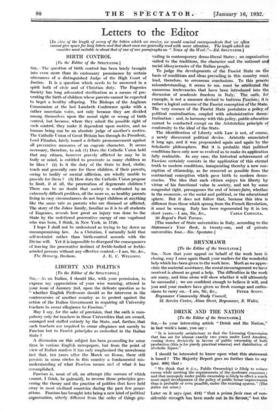LIBERTY AND POLITICS
[To the Editor of the SPECTATOR.]
. .
May I say, for the sake of precision, that the oath is com- pulsory only-for teachers in those Universities that are owned, managed and staffed entirely by the State, and, further, that such teachers are required to swear allegiance not merely to Fascism but to Fascist principles as embodied in the Italian State ?
A discussion on this subject has been proceeding for some time in various English newspapers, but from the point of view of Italian readers it has only emphasized the unwelcome fact that, ten years after the March on Rome, there still persists in some, circles in this country a fundamental mis- understanding of what Fascism means and of what it has accomplished.
Fascism is, most of all, an attempt (the success of which cannot, I think, be gainsaid), to reverse those principles gov- erning the theory and the practice of politics that have held sway in most civilized countries during the past few gener- ations. Fascism has brought into being a new kind of political organization, utterly different from the order of things pre-
Sin,--As an Italkin, I should like, with your permission, to express my appreciation of your wise warning, uttered in your issue of January 2nd, upon the delicate question as to " whether English Professors should so far intervene in the controversies of another country as to protest against the action of the Italian Government in requiring all University teachers to swear allegiance to Fascism."
vailing in contemporary demo-liberal States ; an organization suited to the traditions, the character and the national' anti. racial idiosyncrasies of the Italian people. To judge the developments., of the. Fascist State on the basis of conditions and ideas prevailing in this eountry must lead, therefore, to erroneous eonclusions. To this generic misunderstanding, it seems to me, must be attribatial the numerous irrelevancies that have been introduced into the discussion of academic freedom. in Rely: The oath, toi example, is not a measure desdsed to buttress FaseiSin_; it is rather a logical outcome of the Fascist conception of'the State, The very essence of the Fascist State postulates a poliey,of political centralization, coupled with administrative. deeen-: tralization : and, in harmony with this policy, public education cannot be conducted except on the -Aristotelian principle of conformity to the ideal of the State.
The identification of Liberty with Law is not, of course; a newly discovered political device. Aristotle enunciated it long ago, and it was propoanded again and again by the Scholastic philosophers. But it is probable that political conditions have only now so evolved as to make its application fully realizable. In any case, the historical achievement of Faseiani certainly consists in the application' Of this eternal truth to modern conditions, inaugurating thereby a new cod- ception of citizenship, as far removed as possible Irons the contractual conception which gave birth to modern demo- cracies. The idea that each citizen enjoys his liberty by virtue of his functional value in society, and not by some congenital right, presupposes the end of laissez-faire, whether in the economic, or the social and political, or the educational sphere. But it does not follow that, because this idea is different from those which sprang from the French Revolution, it must be wrong. Italy has been regenerated by it in ten short years.—I am, Sir, &c., CARLO CAMAGNA. 20 Regent's Park Terrace.
[The number of State universities in Italy, according to the Statesman's Year Book, is twenty-one, and of private universities four.—En.-Spectafor.]


































 Previous page
Previous page